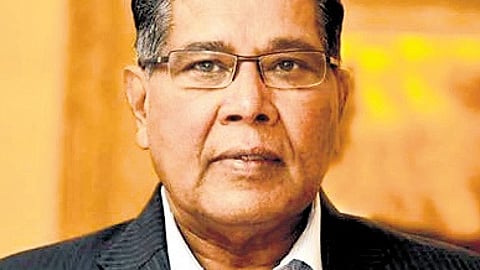

Former deputy chairman of the Rajya Sabha and former chairman of the joint parliamentary committee on Waqf Boards, K. Rahman Khan has led two JPCs in 1999 and 2008 on Waqf boards. The Modi government has referred the contentious Bill to a joint parliamentary committee. The Former Minister of Minority Affairs spoke to Preetha Nair about past committees and why he is not in favour of the proposed amendments to the new Bill.
The Waqf (Amendment) Bill 2024 has been sent to a 31-member JPC for a further scrutiny. Your take.
The government’s decision to send the Bill to the JPC is a welcome step as the views of all stakeholders and affected people can be submitted. I don’t think the present ministry has anything to do with this new Bill, as it’s only a couple of months old. The government claims they held multi-layer consultations in the last 10 years. However, they have not consulted main Muslim bodies. The Muslim Personal Law Board is important for the community. When I headed the JPC, we had a lot of consultations with the Muslim Personal Law Board and various NGOs. It took more than seven months. In 2013, when I was the Minority Affairs minister, we brought major amendments to the Waqf Act 1995 based on Sachar Committee and JPC reports. The Bill was passed in 2013.
The government says the new bill enhances accountability and transparency in the functioning of Waqf boards.
This is not reform, it’s deform. The government has gone back to the pre-1995 Act. When you talk about the functioning of Waqf boards, it is about better management, not of law. The main problem faced by the board of Waqf properties is the removal of encroachment. These properties have been encroached by many individuals, organizations or governments. In the 2013 amendments, we brought important provisions for the protection of the properties. The new Bill has taken away all those provisions and weakened the tribunal.
The proposal to induct non-Muslims has been opposed by Opposition parties and the Muslim bodies..
It was totally uncalled for. I would say it is a deliberate move to create a rift between the Hindu and Muslim communities. Show me a single Hindu temple or Hindu organization where Muslims are in a governing board. Take the Gurdwara Parbandhak Committee, which is also formed by an Act of Parliament. Is there a provision for representation of any other community in the committee?
While introducing the Bill in Parliament, Union minister Kiran Rijiju said the bill is in accordance with the earlier recommendations made by the Sachar committee and the JPC headed by you…
Not a single recommendation has been incorporated from either Sachar Committee or JPC. For example, the Sachar Committee and the JPC had emphatically said that to develop the Waqf properties, they should establish a Waqf development corporation. This was one of the major recommendations of the JPC. The UPA government in 2014 January established a corporation with a capital of Rs 500 crore. In the last 10 years, the government has done nothing, and it is on the verge of closure.
The proposal to make the district collector the arbiter on whether a property is Waqf or government land, has also been contested by many. How do you see it?
Earlier, surveying the waqf properties was handled by survey commissioners under the 1995 Act. Now it is entrusted with district collectors or officers of equivalent rank to bring about transparency. By doing this, they are giving all the powers to the collectors.
The government says the new bill provides representation for women, Bohra and Agakhani communities…
It is a mischievous move by the government. The Bohra and Agakhani communities number a few thousands. They are part of the Shia sect. By doing this, they are trying to divide the Muslim community. The government has no sincerity or honesty towards the community.